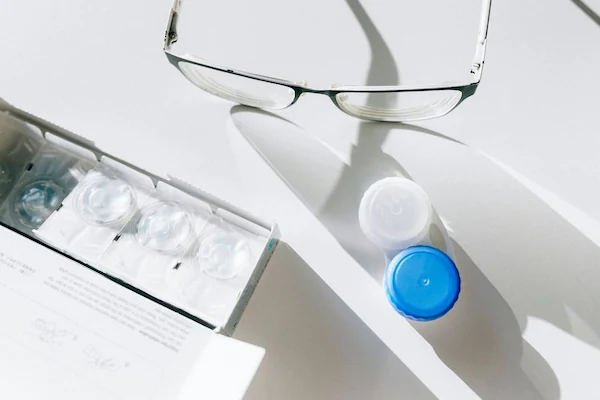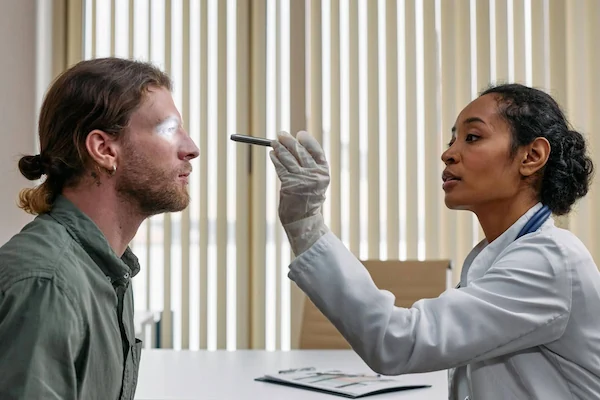
Navigating healthcare as a veteran can get tricky — especially if you need specialized eye care. Many veterans experience health issues that directly stem from their time in the service, and this can include a multitude of conditions that affect their vision. From exposure to hazardous environments to the physical strain of active duty, the reasons behind these issues are as varied as the veterans themselves.
If you need specialized vision care but aren’t sure how to navigate the veteran’s healthcare system, this guide is for you. We’ll explore the various programs and benefits tailored to veterans needing eye care — from prescription glasses to major vision surgery — for easy navigation.
Understanding VA Vision Care Benefits
As a veteran, the first place you should turn for healthcare is Veterans Affairs (VA). This federal department is dedicated to helping veterans find comprehensive and affordable healthcare. Learning how to use their system can take some time, though. Here’s a breakdown of how the VA can help you access necessary eye care.
Does the VA Help with Vision Care for Veterans?
The extent and type of vision care available can vary. Basic vision care, such as eye exams and preventive testing, is covered for all veterans. Specialized care due to an injury or condition from your service most likely won’t be covered. The VA also provides more advanced care when needed; qualified veterans can receive cataract and glaucoma surgery, and veterans experiencing vision loss have access to rehabilitative services.
Eligibility for vision care services through the VA is determined on an individual basis. Depending on your medical history and any injuries you may have sustained during active service, you can get more comprehensive coverage for eye care.
Does the VA Pay for Glasses?
Before you go buy a new pair of glasses, it’s essential to make sure the VA will fit the bill. The cost of your glasses will be entirely covered by the VA if you:
- Have a disability due to your military service;
- Were a prisoner of war (POW);
- Were awarded a Purple Heart;
- Developed a disability or had a disability worsened under VA care; refer to Title 38 United States Code (U.S.C.) 1151;
- Have vision problems due to a disease that you previously received VA care for, such as stroke, multiple sclerosis, or diabetes;
- Have vision problems due to a traumatic brain injury;
- Have vision problems due to a reaction to prescribed medicine or surgery;
- Experience significant visual degeneration to the point that it interferes with your ability to do daily tasks;
Contact your local VA office to confirm your eligibility for VA-sponsored eye care. A benefits coordinator will be able to assist you and determine the amount of coverage you are eligible for.
Does the VA Pay for Contact Lenses?
The VA will sometimes cover contact lenses, but this is usually reserved for veterans who have a medical need for contacts. That means the VA may not cover you if you want contacts and regular eyeglasses. Eligibility for contact lenses through the VA typically requires that the contact lenses be considered medically necessary. If contact lenses are prescribed as part of your treatment plan — which is common for some vision conditions and after some eye surgeries — they will be covered.
Talk to a VA representative about your eligibility to get personalized advice. They can review your medical needs and determine how much the VA will cover.
Addressing Vision Loss and Eye Conditions
If you’re experiencing new developments in your visual health, you want to know that you can get the care you need quickly and easily. Vision loss can happen for various reasons, and finding the root cause is crucial to maintaining your vision.
Does the VA Help with Vision Loss After You Leave the Military?
Yes, the VA provides support and services for veterans experiencing vision loss. Even when you are no longer on active duty, you are eligible for care from the VA. If you experience vision loss, the VA offers various services and solutions, such as the Blind Rehabilitation Services program. This program includes comprehensive rehabilitation that helps veterans adjust to their vision loss, improve their independence, and maintain their quality of life.
The VA also provides low-vision services for veterans who have not lost all their sight but whose vision is significantly impaired. These services are designed to maximize the individual’s remaining vision through adaptive devices, specialized training, and support.
Veterans with vision loss may be eligible for various vision prosthetics, sensory aids, and other adaptive devices. These can include electronic reading devices, computer software that magnifies text or reads aloud, and other technologies designed to assist with daily living activities. While the VA cannot provide you with a guide dog, they partner with agencies that provide them to veterans.
Are Cataracts Considered a VA Disability?
Yes, cataracts can be considered a VA disability if they are related to military service. You and your healthcare providers must prove that your cataracts are directly related to your time in service, secondary to another service-connected condition, or aggravated by your military service.
Cataracts are a medical condition where the lens of the eye becomes cloudy, leading to a decrease in vision. They are often related to aging but can also be caused or worsened by various factors, such as:
- Exposure to certain types of radiation;
- Physical trauma to the eye;
- A secondary condition to diseases such as diabetes.
Cataracts can be removed by surgery, depending on their severity.
Using standardized vision tests and criteria, the VA evaluates cataracts and other vision impairments based on how much they impair your vision. Compensation rates are determined based on the severity of the vision loss and its impact on the veteran’s ability to work and perform daily activities.

Navigating VA Vision Care Services
Although the VA offers various programs for veterans seeking eyecare, the process is not always user-friendly. Here’s what to expect.
How Long Does Getting Vision Care from the VA Take?
How quickly you receive care can depend on many factors. If you just need a routine eye exam, that will be much quicker than scheduling major corrective surgery. Depending on your location and the severity of your condition, you may see a doctor within days or weeks of your initial request.
Wait times for an appointment can depend on the availability of eye care specialists at the nearest VA facility and the current demand for services. Some veterans might see an eye care provider within a few weeks, while others might have to wait longer, especially in areas with high demand or fewer resources. Call your local office for specific time frames for your area and needs.
Urgent or emergent eye care needs are typically addressed more quickly. Veterans experiencing significant or sudden vision problems might receive prompt care, while routine or non-urgent appointments might have longer wait times. Specialized care, such as surgery or treatment for specific conditions like glaucoma or cataracts, may require referrals and additional scheduling. You may go weeks between your initial appointment and the surgery itself.
If the VA cannot provide the needed care in a timely manner or if you live far from a VA facility, you may be eligible for care through the VA’s Community Care program. This allows veterans to receive care from a private eye care provider at the VA’s expense. However, eligibility for this program and the process for receiving authorization can also affect how quickly a veteran can access care.
Your Rights to Vision Care as a Veteran
As a veteran enrolled in the VA health care system, you have rights to various vision care services based on factors like your service history, any service-connected disabilities, and your health needs. Essential vision services available to most veterans include preventive eye exams and vision testing to identify potential issues early.
If you are denied vision care benefits or disagree with the level of care provided, you can appeal the decision with the VA. Working with a patient advocate may be wise to ensure you get the care you need at a fair price.
Advanced Vision Care Options
Beyond basic care and corrective processes, you may also want to consider more advanced vision care. LASIK and other vision correction surgeries can help you lead a healthier life with less dependence on corrective lenses.
Does the Military Pay for LASIK Surgery?
Generally, the VA will not cover LASIK surgery. LASIK is considered an elective surgery, and unless a provider deems it medically necessary, it will not be eligible for VA coverage. Though the military sometimes provides LASIK to active-duty service members, this does not apply to veterans.
However, there may be exceptions depending on your circumstances. For example, you may be eligible to receive refractive surgeries through the VA if you have a medical condition or impairment caused by military service. These rare instances require thorough evaluation and justification by VA healthcare providers.
However, you can always seek LASIK treatment on your own through reputable private practitioners. Talk with your insurance agency to determine what you can expect to pay for the procedure, and ask your VA-provided eye doctor to refer you to a LASIK specialist in your area.
What Is the VA Rating for Eyesight?
The VA follows the criteria outlined in the VA’s Schedule for Rating Disabilities. Depending on the specific condition affecting the veteran’s eyesight, vision impairments are rated under various diagnostic codes. The rating can range from 0% to 100% and reflects the extent to which the impairment affects daily function.
Two primary factors considered in rating eyesight impairment are:
- Visual Acuity: This refers to the clarity or sharpness of vision, typically measured by a Snellen chart — the iconic chart you’ve seen at every optometrist’s office. If your best-corrected vision (with glasses or contact lenses) in your better eye is 20/40 or better, you typically do not receive a compensable rating for visual acuity loss. However, poorer levels of corrected vision can qualify for a rating, with more severe vision loss receiving higher ratings.
- Visual Field: This measures the full horizontal and vertical range of what someone can see without moving their eyes. Significant visual field loss can also lead to a compensable VA rating, with the degree of impairment determining the specific percentage.
Ratings can also be assigned for conditions that lead to partial vision loss, such as scotomas (blind spots), diplopia (double vision), or other specific eye conditions like glaucoma and cataracts, based on their impact on vision. These ratings determine the kind of medical care you need and how much the VA will cover.
Because the rating process and criteria can be complex, especially with conditions that may not fit neatly into the VA’s rating schedule, seek assistance from VA-accredited representatives or organizations when applying for benefits or appealing a decision.

How Long Do You Have to Utilize VA Benefits?
Once you have enrolled in VA benefits, your access to them will not expire. You can enroll anytime after being discharged from the military, and you will have access to the VA’s program indefinitely. However, if you experience an injury or condition due to your time in service, there may be a limited window in which you can receive free care for that condition.
Veterans who served in a combat zone have an enhanced eligibility period for free medical care for any condition related to their service for five years after discharge. After this period, they may still enroll in VA health care, but their care may be subject to VA health care copays. Conversely, veterans with a service-connected disability rating can apply for VA health care at any time, with no expiration. Talk to your local VA office for more specific guidelines about eligible care.
Navigating the landscape of vision care for veterans can appear daunting at first glance. However, the VA offers comprehensive and affordable services for all enrollees. The VA stands ready to assist whether you require corrective glasses, specialized surgery, or adaptive technologies for vision impairment. By engaging with the VA health care system, exploring your eligibility, and understanding the benefits available, you can take significant strides towards maintaining or enhancing your vision health.
Additional Resources for Veterans
For more information and assistance, we’ve compiled these resources for veterans seeking vision care.
Charities That Help Veterans Access Vision Care
- Wounded Warrior Project: This organization supports veterans who incurred a physical or mental injury, illness, or wound while serving in the military post-9/11, offering various programs, including access to vision care.
- Local Lion’s Clubs: Often engaged in community health projects, local Lion’s Clubs frequently assist veterans needing vision care through local service initiatives and partnerships.
- Blinded Veteran’s Association: Dedicated to helping veterans who have lost their sight, this association offers resources, support, and advocacy to navigate life after vision loss.
- Optometry Cares: This foundation of the American Optometric Association runs programs that provide eye care services to those in need, including veterans, ensuring access to essential vision care.
- Disabled American Veterans: (DAV) is a leading nonprofit charity that provides lifetime support for veterans of all generations and offers assistance in accessing various benefits, including vision care.
- National Veteran’s Association: While not as widely known as some others, this organization aims to support veterans through various programs, including assistance accessing healthcare and vision care services.
Vision Care for Veteran Families
- VA Vision Care Benefits: Available to eligible veterans, these benefits offer comprehensive vision care, including exams, preventive testing, and treatment services tailored to veterans’ specific health needs.
- VSP’s Veteran Program: VSP Global provides a vision care program specifically for veterans and their families, offering affordable eye care and eyewear to those who may not qualify for government plans.
- Tricare Vision Care Benefits: Designed for military members and their families, Tricare offers vision benefits that cover annual eye exams and other vision-related services, varying by plan.
- FEDVIP: The Federal Employees Dental and Vision Insurance Program extends to certain military retirees and their families, providing comprehensive vision insurance with options from several carriers.
Navigating Vision Care Resources as a Veteran
- Wounded Warriors Project Benefits Assistance: Offers personalized support in navigating and accessing a wide range of veteran benefits, including vision care, through direct assistance and advocacy.
- VA Patient Advocacy Program: A dedicated program within the VA system that helps veterans communicate their healthcare needs, resolve concerns, and access the full spectrum of VA benefits, including vision care.
- VFW Healthcare Watch: An initiative by the Veterans of Foreign Wars that monitors healthcare policies affecting veterans, offers guidance on accessing VA benefits, and advocates for quality care, including vision services.

